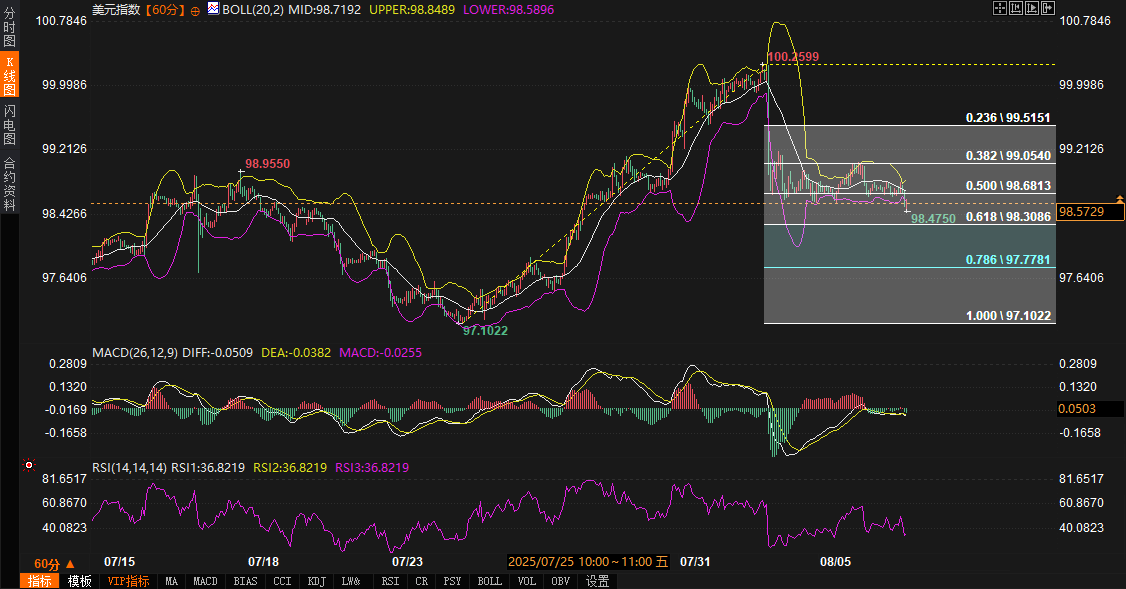The US Dollar Index is at risk! Countdown to the fall of the 97.77 defense line: With the bears pressing in, where is the bulls' last bastion?
2025-08-06 20:09:32

Market background: uncertainty dominates sentiment
At the beginning of this week, the US dollar index gradually retreated after experiencing significant volatility following the release of the non-farm payroll data. Monday's weak ISM services data further weakened the dollar's rebound momentum. Meanwhile, several key revelations from President Trump in a CNBC interview injected new uncertainty into the market. First, Trump stated that he would soon announce his nominee for Federal Reserve Chair, with potential candidates including Kevin Warsh, Kevin Hassett, Chris Waller, and David Malpass. This news sparked widespread speculation about the Fed's future policy stance. Furthermore, Trump's comments on tariffs in the semiconductor and pharmaceutical industries, as well as his signals that the trade truce with China might be extended, further exacerbated risk aversion. While market expectations for an extension of the trade truce remain relatively stable, the tariff rhetoric still exerted moderate pressure on non-US currencies such as the RMB.
From a fundamental perspective, developments within the Federal Reserve are also worth watching. Today, the market will focus on speeches by FOMC members Lisa Cook and Susan Collins. Both members are voting members and tend to be dovish. Following last week's weak non-farm payroll data, market expectations for a September Fed rate cut have intensified. If the speeches by the two members further reinforce this expectation, the US dollar index could face greater downward pressure. Analysts from prominent institutions suggest that the dollar's overall weakness is likely to continue this week, driven by the market's re-pricing of a dovish Fed policy and the potential policy uncertainty created by Trump's early nomination of the Fed chair.
Fundamental analysis: Policy expectations and external pressures intertwined
The Federal Reserve Chair nomination is undoubtedly a key market focus. Trump recently clarified that Treasury Secretary nominee Scott Bessent is no longer on his shortlist for Fed Chair, with Warsh, Hassett, Waller, and Malpass emerging as the leading candidates. Warsh, with his hawkish stance and monetarist approach to inflation, is considered a potential positive for the US dollar. In a May conversation with the Hoover Institution, he emphasized that restoring price stability is key to restoring the Fed's credibility. If Warsh is nominated, the US dollar index could find support due to market expectations of hawkish policies. In contrast, Hassett and Malpass are considered more dovish and likely more inclined to align with Trump's policy intentions, which could be a negative factor for the US dollar. Waller is seen as a middle-of-the-road option, and his nomination is likely to have a neutral impact on the dollar.
Beyond Fed policy expectations, Trump's tariff rhetoric also adds complexity to the market. While the US-China trade truce is widely expected to continue, the potential implementation of tariffs on semiconductors and pharmaceuticals could still put pressure on global risk assets and non-US currencies. Furthermore, ongoing tensions between Russia and Ukraine have fueled some safe-haven demand, partially supporting the dollar's status as a safe-haven currency, though this support appears limited in the current environment.
It's worth noting that Trump's recent public criticism of the Bureau of Labor Statistics (BLS) employment data revisions did not elicit a significant market reaction. However, if the new Federal Reserve Chair candidate echoes this sentiment, it could raise market concerns about the consistency between Fed policy and official data, potentially impacting the stability of the US dollar. Overall, fundamental factors suggest that the US dollar will remain under pressure in the short term, with market sentiment trending toward caution amidst the dual forces of policy uncertainty and weak economic data.
Technical analysis: oversold signals and key nodes
Technically, the US dollar index is showing a clear weakening pattern. According to the latest data, after falling below the 61.8% Fibonacci retracement level (98.3086), the US dollar index has failed to stabilize, indicating that bearish momentum remains dominant. The Relative Strength Index (RSI, period 14) is currently at 35.0472, approaching oversold territory, suggesting a possible short-term technical correction. Furthermore, the lower Bollinger Band has been broken, and the MACD fast and slow lines are entangled below the zero axis, indicating bearish market momentum, but the possibility of a short-term correction is increasing.

Short-term trend possibility analysis
Oversold Repair Scenario <br/>If the US Dollar Index finds support near 97.7781 (78.6% retracement), it could trigger a technical rebound targeting the psychological level of 98.00, or even further to the 61.8% retracement level (98.3086). From an indicator perspective, if the RSI rebounds above 40 from oversold territory and the MACD forms a golden cross, it would provide further confirmation of the rebound momentum. This scenario could be driven by a short-term improvement in market sentiment or a easing of dovish rhetoric from Federal Reserve officials.
Continued Downward Scenario <br/>If the support level of 97.7781 fails, the US dollar index could fall further to the previous low of 97.1022, or even challenge the key support area of 96.80-97.00 in 2023. The widening opening of the Bollinger Bands and the continued pressure on the lower band suggest that bearish momentum remains strong. If the MACD forms another death cross and the RSI fails to rebound effectively, the downward trend may continue.
Key observation signals
Rebound confirmation signal : We need to closely monitor whether the US dollar index can stabilize at 98.00 and drive the RSI back into the neutral zone (40-50). If the price breaks through 98.3086 and stabilizes, it may signal the formation of a short-term bottom.
Signal of continued decline : If the rebound fails to break through 98.3086 and MACD forms a death cross, the bearish trend may further strengthen, and we need to be vigilant against a rapid drop in price to 97.1022 or lower.
It's important to emphasize that the dynamic evolution of technical indicators requires a comprehensive assessment based on real-time data and market sentiment. While the current technical picture suggests oversold conditions, fundamental factors may have a stronger driving effect on short-term trends.
Future Trend Outlook
Looking ahead to the week ahead, the US dollar index will be influenced by multiple factors. From a fundamental perspective, the progress of the Federal Reserve Chair nomination will be a key focus for the market. If a hawkish candidate such as Walsh is nominated, the US dollar may find some support; conversely, if a dovish candidate such as Hassett or Malpass is elected, the US dollar may face further downward pressure. Furthermore, speeches by FOMC members and market adjustments to expectations for a September rate cut will also have a direct impact on the US dollar's performance. Tariff rhetoric and developments in the Russia-Ukraine situation may continue to infuse risk aversion into the market, but their support for the US dollar is likely to be limited.
Technically, the US Dollar Index is currently at a critical juncture, with support at 97.7781 acting as a key short-term trendline. If the price stabilizes and breaks through 98.00, a technical rebound could begin. A break below 97.7781 could trigger further declines to 97.1022 or even the 96.80-97.00 range. Market participants should closely monitor indicators such as the RSI and MACD, as well as price performance near key levels.
Overall, the US dollar index faces downward pressure in the short term, but oversold signals suggest a potential technical rebound. Future trends will depend on the evolution of Federal Reserve policy expectations and the development of external risk events. Market participants should remain vigilant and adjust their judgments dynamically based on real-time data.
- Risk Warning and Disclaimer
- The market involves risk, and trading may not be suitable for all investors. This article is for reference only and does not constitute personal investment advice, nor does it take into account certain users’ specific investment objectives, financial situation, or other needs. Any investment decisions made based on this information are at your own risk.





















